Introduction
The University of California (UC) Board of Regents is the governing body of the University of California system. The Board is comprised of 26 members, who are appointed by the Governor of California, and are responsible for overseeing the management and operations of the UC system. The Board has the power to make decisions about the system’s policies, budgets, and other matters related to the system’s operations. Recently, the Board of Regents has been in the news as they consider whether or not they can stop UCLA, one of the system’s most prestigious universities, from continuing its operations. In this blog post, we will explore the power of the UC Board of Regents and whether or not they can actually stop UCLA from continuing its operations.

The Power of the UC Board of Regents
The UC Board of Regents is the highest governing body of the UC system, and as such, has a great deal of power over the system’s operations. The Board has the authority to approve or reject policies, set budgets, and make decisions about the system’s overall direction. The Board also has the power to appoint and remove the president of the UC system, and has the authority to appoint and remove faculty and staff from the system.
In addition, the Board has the power to make decisions about the system’s academic programs, and can even make decisions about how the system’s campuses are managed and operated. This means that the Board has the power to make decisions about the system’s operations, including decisions about whether or not to stop a particular campus from continuing its operations.
Can the UC Board of Regents Stop UCLA?
Given the power of the UC Board of Regents, it is possible for them to stop UCLA from continuing its operations. However, the Board would need to make a decision to do so, and there are several factors that would need to be considered before such a decision is made.
First, the Board would need to consider the impact that such a decision would have on the UC system as a whole. Closing a campus, especially one as prestigious as UCLA, would have a major impact on the system’s reputation, and could have a long-term negative effect on the system’s finances. The Board would need to consider the potential financial and reputational implications of such a decision before making it.
Second, the Board would need to consider the potential legal implications of such a decision. Closing a campus, especially one as well-established as UCLA, could have significant legal implications. The Board would need to consider the potential legal implications of such a decision before making it.
Third, the Board would need to consider the potential political implications of such a decision. Closing a campus, especially one as well-known as UCLA, could have significant political implications. The Board would need to consider the potential political implications of such a decision before making it.
Finally, the Board would need to consider the potential public opinion implications of such a decision. Closing a campus, especially one as popular as UCLA, could have significant public opinion implications. The Board would need to consider the potential public opinion implications of such a decision before making it.
Conclusion
The UC Board of Regents has the power to make decisions about the system’s operations, including decisions about whether or not to stop a particular campus from continuing its operations. However, the Board would need to consider the potential financial, legal, political, and public opinion implications of such a decision before making it. Ultimately, the decision to stop UCLA from continuing its operations would be a difficult one, and one that the Board would need to consider carefully before making.”